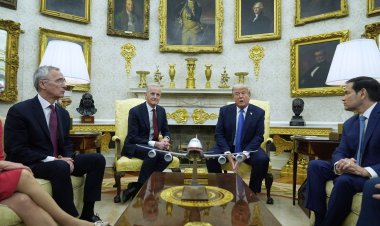Centrist Democrats hatch secret plan to head off debt ceiling calamity
The White House and party leaders, however, are distancing themselves from the effort.


A group of House Democrats is secretly crafting a fallback plan to avoid an economy-rattling debt default.
The White House wants no part of it.
The rogue band of moderate Democrats has spent weeks constructing a break-glass deal with centrist Republicans in case the country goes all the way to the brink on the debt ceiling. As the summertime deadline for action approaches, they’re worried a prolonged standoff could lead to fiscal disaster.
But Biden officials and party leaders, however, see it far differently and are bristling at the attempts at a compromise, according to four lawmakers familiar with the discussions. Their party’s message to those plotting centrists: Your efforts are unlikely to succeed and risk hurting our goal of a clean debt ceiling increase.
The intraparty friction is growing as Washington’s debt crisis gets less theoretical and more urgent with each passing week. And the freelancing Democratic centrists may not have helped their cause by getting involved just as party leaders began seeing a political advantage in the fiscal fight — as long as they can keep the onus on Speaker Kevin McCarthy to unveil a plan that might pass the GOP-controlled House, with unpopular spending cuts likely to be attached.
“We're gaining ground because of [House Republicans’] inability to put together a plan," Senate Majority Leader Chuck Schumer said in a brief interview. “I'm certainly willing to entertain a mix of things on the budget. Not on the debt ceiling."
A White House official said the administration has "not spoken to the Problem Solvers about this." Centrist Democrats, however, say they've been made well aware the effort isn't likely to win any endorsements from party leaders — and have decided to forge ahead anyway as the debt impasse sparks high anxiety, with Congress gone until April 17.
Biden and McCarthy have had zero recent contact on the debt other than jabs exchanged through the press, despite the jittery U.S. banking sector further rattling the situation. Democratic leaders say they’ll accept only a clean debt limit bill, but emboldened House Republicans insist that would never pass their chamber.
Complicating it all: Republican leaders won’t yet describe precisely what they want in exchange for their votes to raise the nation's borrowing ceiling. Schumer, in response, has taken up the chant “show us your plan” for more than two months and counting.
Enter that group of moderate Democrats, who have privately met with GOP centrists since February, in defiance of their leadership. Their talks remain in the early stages, and two lawmakers familiar with the discussions said they have not honed specific details yet.
One centrist Democrat, who along with others addressed the talks on condition of anonymity, observed that “you’ve got party leaders in both houses that don’t want us to talk to one another.”
They're not listening to those nudges to stop talking: “None of us work for the White House. We work for our constituents. And they should start talking and negotiating,” said Rep. Jared Golden (D-Maine), who co-leads the centrist Blue Dog Coalition.
Centrist Republicans involved in the discussions call them a recognition of what Biden and most Hill Democrats have denied — McCarthy’s GOP simply won’t accept a clean debt hike. And as two months have passed since McCarthy’s last sitdown with Biden, moderate Rep. Don Bacon (R-Neb.) said he’s one of those working within the bipartisan Problem Solvers Caucus because “we’ve got to have a plan B.”
With debt limit talks stuck in a mud puddle, House Republicans have seemingly abandoned plans to introduce a budget this spring, which could springboard the talks. That's because GOP leaders are struggling to coalesce around a viable blueprint thanks to their members’ ever-expanding wish list and the realization that, for some hardline conservatives, there may be no level of austerity that would cut deep enough.
McCarthy and his team still want to draft their own package of deficit-reducing proposals, which his advisers say would mix ideas such as social program cuts with policies to increase U.S. energy production or tighten border security. Even so, the House GOP may not be able to unify behind such a plan.
“They don't have a working majority,” Senate Majority Whip Dick Durbin (D-Ill.) said.
Those dynamics have convinced Schumer and Biden administration officials that they’re winning the public messaging battle over the debt ceiling. And so they're increasingly content to hold the line on their demand for a clean increase to the borrowing limit.
The White House has jumped at opportunities to hammer Republicans over their proposed spending cuts, terming one set of demands from the House Freedom Caucus a "five-alarm fire."
While most lawmakers expect the standoff will drag into the summer, Biden allies have circulated recent remarks from centrist members like Sen. Mitt Romney (R-Utah) expressing concern over the prospect of a debt ceiling crisis — hopeful that more Republicans are deciding it's not worth the fight.
“There’s starting to be more appreciation that the full faith and credit of the United States is not a source of leverage,” a White House official said.
But Senate Republicans across the Capitol aren’t fleeing McCarthy’s foxhole yet. The most active deal-cutting senators are either sitting out or in the dark.
“The only hints of an idea I hear is an effort among [House] Republicans to come up with something they can vote for and send it over here,” said Romney. “I don’t know of any bipartisan [effort] here. Not with me.”
Sen. Susan Collins (R-Maine) also said she’d heard nothing of the Problem Solvers’ work.
“I don't think you can expect a lot of movement on an issue like that until you start getting a little bit closer," Senate Minority Whip John Thune (R-S.D.) said, adding that Democrats "want to run out the clock" but the strategy might not work: "I don't think that they have that option."
The Biden administration insists it won’t shift course. In a sign of the White House’s growing confidence, aides quickly brushed off McCarthy’s demand for a second meeting, arguing that there’s little point in the two men sitting down until Republicans decide among themselves what they want.
While Biden has not completely ruled out talking with McCarthy before Republicans publish their own budget, there’s little desire among aides to do anything that might help the speaker unite his fractious conference.
“How does he win here?” one economic adviser to the White House said of McCarthy. “They don’t really have a strategic plan.”
The White House has yet to weigh in formally on the ongoing centrist discussions about a backup approach. But there's little doubt that it’s at odds with Biden's preferred strategy. If anything, one adviser suggested, the likelihood that the moderates' effort implodes or fails to win over either party's leadership may only end up illustrating how far apart the two sides are.
Back in the Capitol, several Democrats said it’s worthwhile to discuss alternatives and broadly urged Biden to restart talks with the GOP.
Rep. Vicente Gonzalez (D-Texas), another member of the Problem Solvers, said it’s on both Biden and McCarthy to come up with a plan. ”Otherwise, it’s going to be a disaster. It already is, right?”
Jennifer Scholtes and Caitlin Emma contributed to this report.












